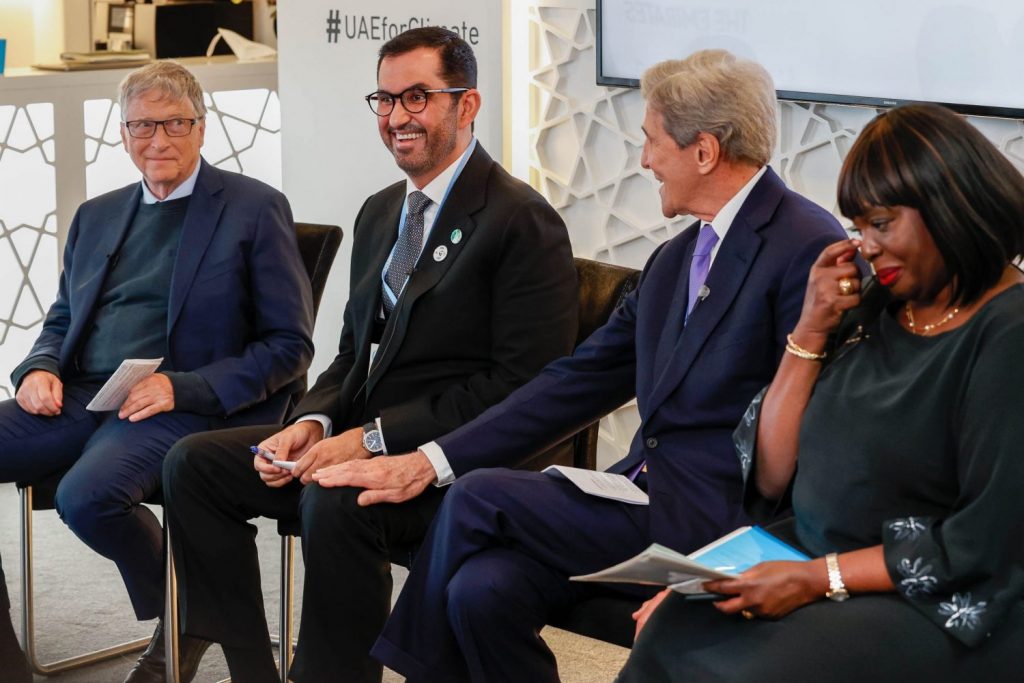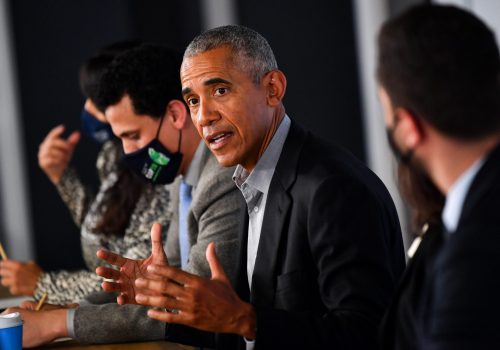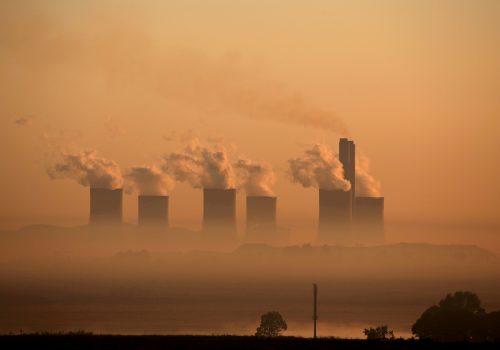The twenty-sixth United Nations Conference of the Parties (COP26) on climate change kicked off this week with major pledges to end deforestation and reduce methane emissions.
But that represents only a fraction of the battle to save the planet—much of which, experts say, now relies on innovation.
That was the big takeaway from an Atlantic Council Live from COP26 event on Wednesday, featuring Breakthrough Energy founder and Microsoft co-founder Bill Gates; US climate envoy John Kerry; Sultan Ahmed Al Jaber, the United Arab Emirates’ (UAE) special envoy for climate change and minister of industry and advanced technology; and Kenyan Cabinet Secretary for Foreign Affairs Raychelle Omamo. The event, hosted by the Council’s Global Energy Center, was moderated by Atlantic Council President and CEO Fred Kempe.
But leveraging intellectual and technological prowess to make a lasting impact on climate change won’t be easy. For one, Kerry said, it requires harnessing the power of both the public and private sectors across the regional, national, and international levels.
“The simple reality is that this challenge is so big and so urgent—and this decade so important—that there’s absolutely no way that we will get where we need to go unless everybody is embracing everything,” he said.
Watch the full event
Here are some more highlights from Wednesday’s event in Glasgow, Scotland:
Seeds of success
- Among the most vulnerable to global warming, Gates said, are small-time farmers in countries around the equator who will bear “the vast majority of climate suffering” because of low-quality seeds that are unable to thrive in the changing environment. That, in turn, will fuel both malnutrition and instability.
- Gates praised the Agriculture Innovation Mission for Climate—launched on Tuesday by the United States and the UAE to boost climate-smart agriculture—as an example of how broad global partnerships can help local farmers. His Bill & Melinda Gates Foundation will also chip in $315 million for a seed consortium called the CG system. “Directing the seed and livestock work of the countries to really have an impact for those farmers—that’s our goal,” he said.
Power in your pocket…
- In Kenya, Omamo said, many ordinary citizens are already equipped with a transformative technology that will help them adapt to climate change: mobile phones. That’s allowed farmers better access to credit, weather information, and the ability to coordinate irrigation systems, among many other benefits.
- “That’s the kind of innovation we want to see on our continent, because it’s the type of innovation that is cheap, accessible, democratizes technology and brings technology to the youth of ordinary people—particularly women,” she said.
…and in the private sector
- Kerry seemed particularly impressed with the direction players in the private sector—including asset managers and major banks— are heading, claiming that they are “stepping up in real and unprecedented fashion.”
- He adds that businesses are not only increasingly embracing Environmental, Social, and Governance standards, but also factoring in the potential costs of failing to act in their fundamental strategies: “They see that expenses are going to go up for doing business, trillions will be spent doing things that might’ve been avoidable if we innovated correctly and moved rapidly.”
Paving the way
- Al Jaber, whose country is bidding to host COP28 in 2023, is energized by “the sense of urgency that we feel everywhere.” He believes the UAE—the first Gulf state to have committed to net-zero carbon emissions by 2050—is well-placed to lead by example, pointing to his young nation’s experimentation with blue ammonia and hydrogen technologies.
- “Everyone in the world was saying that these were impossible missions to achieve, and in a very short period of time, we were able to prove the viability… and the commerciality of those technologies,” Al Jaber said.
- Pledging to pursue a “comprehensive approach” by including sectors from academia and research to finance and technology, Al Jaber vowed to transform his country into “a true beacon of hope for the advancement of real climate action solutions.”
Dan Peleschuk is the New Atlanticist editor at the Atlantic Council.
Further reading
Sun, Oct 31, 2021
Experts react: Can COP26 negotiators sustain the momentum?
New Atlanticist By
Atlantic Council experts deliver insightful analysis on the COP26 developments that will matter most in the fight against climate change.
Thu, Oct 14, 2021
For Africa to go green, the private sector must step up. Could COP26 provide an answer?
AfricaSource By
The continent possesses an abundance of renewable-energy-production capabilities—but capitalizing on its potential remains a challenge.
Mon, Aug 9, 2021
FAST THINKING: What the UN climate report didn’t say
Fast Thinking By
The report maps a path to avert planetary catastrophe if humans completely stop adding carbon dioxide to the atmosphere by 2050. But is that even possible?
Image: **Picture issued on behalf of UAE COP26 Delegation** His Excellency Dr Sultan Al Jabar with John Kerry & Bill Gates during COP26 in Glasgow, Scotland. Wednesday 3rd November 2021. Picture by John Young / YoungMedia All images © www.YoungMedia.co.uk




On Twitter? Follow the conversation with @AtlanticCouncil and @ACGlobalEnergy using #ACLivefromCOP